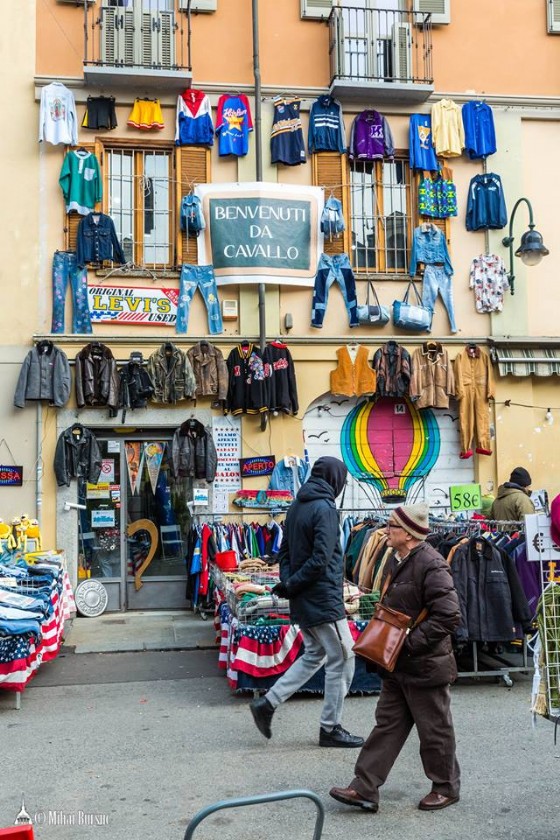Report
‘Violent gentrification’ in Turin as 800 merchants banished from flea market
Turin is kicking independent merchants out of the historic flea market and sending them to a new, desolate location behind a cemetery. ‘Sending them to via Carcano means zero income for these people.’

Vintage clothes and shoes, records, plastic jewelry, video cassettes, books—all will be gone. After 150 years of history, the Balon, the historic flea market of Turin, is losing its least-pretentious part, which has managed to take old and worn items and turn them into productive activity and social integration. The merchants who are being kicked out are of many ethnicities and skin colors: one sees many Africans among them, and plenty of native Italians as well. Their customers are just as diverse a group. Now, everyone is being swept up in a process of so-called “urban renewal” that aims to turn the Porta Palazzo neighborhood into a haven for the “quality food” industry. It’s business as usual for a de-industrialized city trying to extract value from their territory, mowing down the rare shoots sprouting up in a desert of unemployment that is undermining the social fabric of the communities.
On Saturday, the over 800 merchants who are members of Vivibalon, the association which has been organizing the most famous of the city’s popular markets for almost 20 years, were expected to set up their wares at the lovely new location that the City of Turin has made available to them: behind the cemetery. Months ago, the M5S majority on the city council had planned to send everyone off to Mirafiori, in a disused part of the old factory that used to employ 60,000 workers—a proposal that sounded so on-the-nose that many thought it was a joke. The 5 Stars were quite serious, but finally backtracked, and the location behind the cemetery ended up looking like the better solution.
It is a place in the middle of nowhere, without even a bar in sight, set up among the tombstones, on a concrete esplanade installed with no rhyme or reason. On Saturday, the merchants refused to go there and chose to go together to their usual place, Balon, and set up their traditional market—technically illegal, because they are no longer allowed there. “Resistance at Balon,” said a banner hung up in plain view.
“Sending them to via Carcano means zero income for these people,” explains Alessandro Stillo, vice-president of Vivibalon. “They have already been going behind the cemetery on Sundays, and there are no sales to be made there. Stealing away this historical commercial spot in Turin, which has always been there, from the little people means taking away their opportunity to work and earn a living. And it is also a huge cultural loss: all the people of Turin, rich and poor, have always gone to this market, and this was an opportunity to mingle and get to know each other.”
So, why do they have to go? The city councilor in charge of social policies, Marco Giusta, has “chosen not to comment,” and has thrown the responsibility onto the councilor in charge of commerce, Alberto Sacco. The latter has touted the initiative of the redevelopment of the Porta Palazzo through the establishment of new restaurants and meeting places as his own, but, as regards those who are being expelled, he is also choosing not to comment.
In the background of all this, there is also the neighborhood committee which has lodged protests against the supposed degradation of the market area, spreading the myth that “stolen stuff” is being sold there—with more than a hint of Salvinianism, which seems to be advancing inexorably like a steamroller. But the market has only been selling objects of very little value, and is one of the most supervised sites in Turin. When a young street salesman was killed last year by a deranged man, it was not at Porta Palazzo, but behind the cemetery, at the new location where they want to move them.
Also in the background are the interests of the antique shops of the “high-class” part of Balon, who would like to have less “disorder” around—and, last but not least, in the area where the social organizations who are true “patron saints” of Turin, Sermig and Cottolengo, operate, many locals are choosing to remain silent in front of what is happening.
Stefano Lo Russo, the leader of the Democratic Party in Turin, said: “We were still working on the overall vision for the renewal project, but they already chose to proceed via administrative acts. We value the project in general terms, and, in fact, the Democratic Party has supported it in the City Council. However, the way the current city leadership is implementing it has a great fundamental flaw: the renewal project is based on nothing more than pure market forces, without any public social support. This is very different from what was done, for example, with the Quadrilatero Romano project in the ‘90s. We run the risk of moving towards a violent gentrification, with serious immediate effects on the Aurora area, already in a very delicate condition.”
We found Giovanni Semi, a professor of sociology at the University of Turin who studies the phenomenon of gentrification, at Porta Palazzo on Saturday morning: “The ‘normalization’ of this market is the capstone of the project to control and transform the neighborhood. It erases twenty years of history, and does so in the most violent way possible, eliminating the most aesthetically displeasing and the easiest target to go after: the poorest. What leaves me dismayed is the intolerance towards anything that looks ‘degraded,’ the impatience for anything that doesn’t fit into a preconceived notion of decorum and beauty.”
In all likelihood, those expelled will return to Balon next Saturday as well and continue to resist by setting up their market. However, unlike this Saturday, they may find the police ready and waiting for them.
Originally published at https://ilmanifesto.it/al-balon-non-ce-posto-per-i-poveri/ on 2019-01-20
